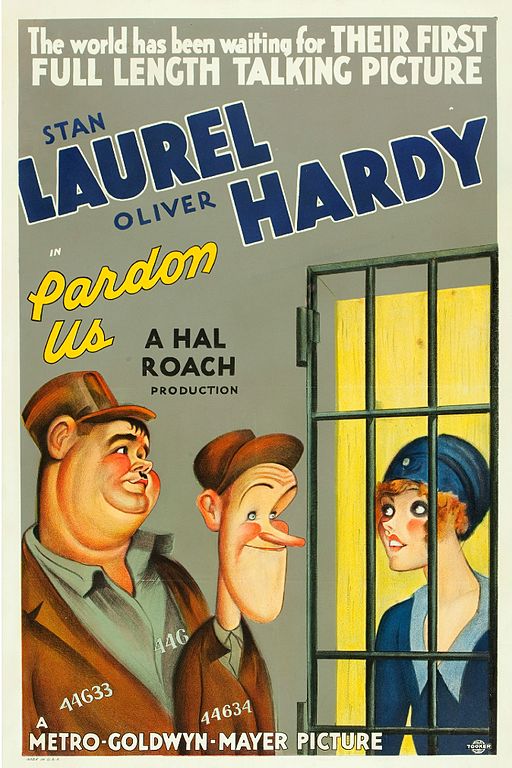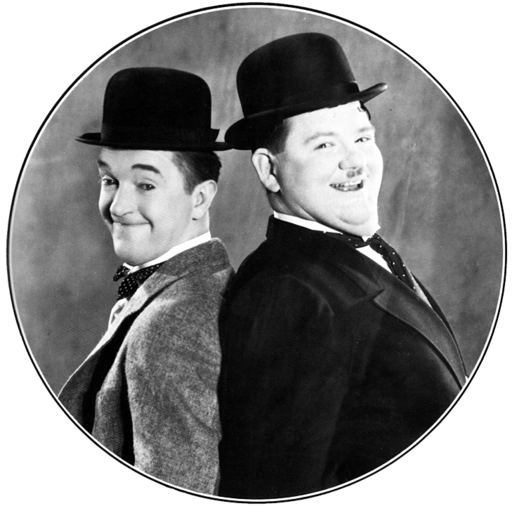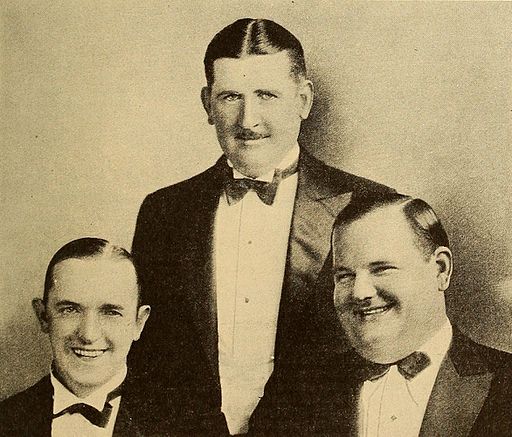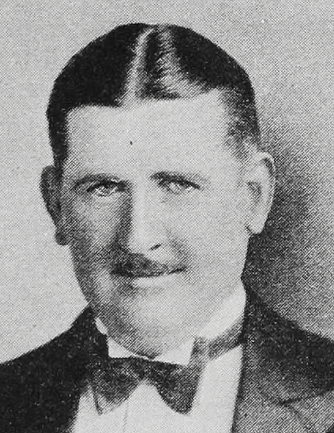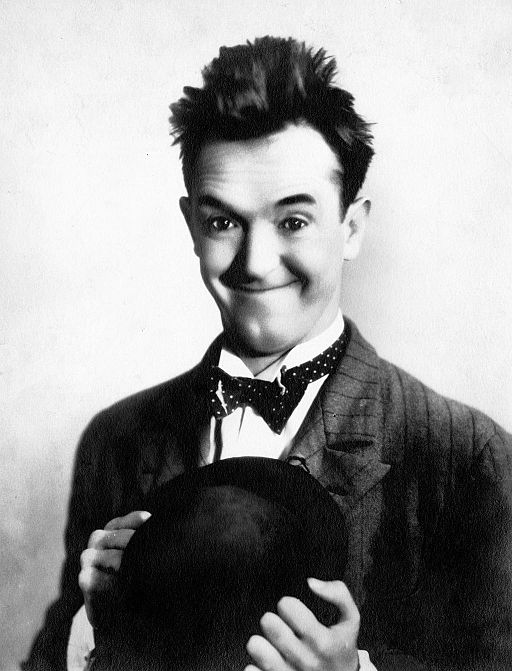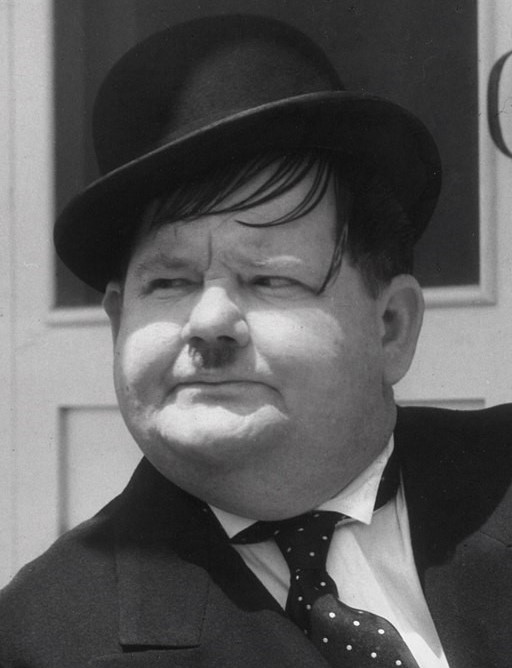Pardon Us - 1931
back| Released by | Metro-Goldwyn-Mayer |
| Director | James Parrott |
| Producer | Hal Roach |
| Script | H.M. Walker (dialogue), James Parrott (uncredited) |
| Cinematography | Jack Stevens |
| Music by | Leroy Shield, Marvin Hatley |
| Running time | 70 minutes |
| Film budget | Not publicly disclosed |
| Box office sales | Unknown, but the film was a commercial success at the time of its release |
| Main cast | Stan Laurel - Oliver Hardy |
Pardon Us
Laurel and Hardy’s First feature-length Film
"Pardon Us" was Laurel and Hardy's first feature-length film and represented a significant step in their careers. The plot revolves around the duo accidentally ending up in prison and the comedic situations that ensue. It was released in both a shorter, original version and a longer, extended version.
The financial details such as the film's budget and exact box office sales are not well-documented, which is common for films from this era. However, "Pardon Us" was known to be a commercial success, contributing to Laurel and Hardy's popularity and setting the stage for their subsequent feature films.
Related
Pardon Us – 1931
Overview and Summary
"Pardon Us" is a classic comedy film released in 1931, featuring the iconic duo of Stan Laurel and Oliver Hardy in their first feature-length film.
Setting and Premise: The film opens in the Prohibition-era United States. Laurel and Hardy play street peddlers who, in a comical turn of events, accidentally sell bootleg beer to a policeman. This mishap lands them in prison, setting the stage for a series of humorous situations.
Prison Life: Once in prison, the duo's naive and bumbling nature immediately sets them apart from the other inmates. They inadvertently cause chaos, including a memorable scene where their attempt at dental surgery using a makeshift drill leads to hilarious consequences.
Escape and Recapture: The plot takes a turn when Laurel and Hardy get involved in a prison break. The escape scene is filled with slapstick humor and improbable situations, typical of their comedic style. However, their freedom is short-lived as they are soon recaptured.
Resolution: The film concludes with Laurel and Hardy inadvertently aiding the prison authorities in quelling a riot. This act leads to their release from prison, and the film ends with them walking away, only to find themselves in another comical predicament.
Comedic Style: "Pardon Us" showcases Laurel and Hardy's classic comedic style, which includes slapstick humor, visual gags, and a blend of verbal wit. Their portrayal of two innocents in a rough prison environment creates a stark yet humorous contrast.
Social Commentary: The film subtly comments on the Prohibition era and the American penal system, although these themes are primarily a backdrop for the comedy. The depiction of prison life, albeit exaggerated, reflects the era's attitudes and challenges.
Character Dynamics: The dynamic between Laurel and Hardy is central to the film's humor. Laurel's childlike innocence and Hardy's pompous yet equally inept character create a comedic synergy. Their interactions, often leading to disaster, are a hallmark of their films.
Innovations in Comedy: "Pardon Us" was groundbreaking for its time, moving Laurel and Hardy from short films to the feature-length format. This transition allowed for more developed narrative structures and elaborate comedic sequences, setting a precedent for future comedy films.
Cultural Impact: The film solidified Laurel and Hardy's status as leading comedians of the era. Their influence on comedy is enduring, with "Pardon Us" often cited as an early example of the feature-length comedy genre.
In summary, "Pardon Us" is a significant film in the Laurel and Hardy canon, showcasing their comedic talents in a longer format. It blends humor with a light touch of social commentary, making it a noteworthy film in the history of cinema comedy.
Short Clip from Pardon Us:
Full Cast of “Pardon Us”:
- Stan Laurel as Stan
- Oliver Hardy as Ollie
- June Marlowe as The School Teacher
- Wilfred Lucas as The Warden
- James Finlayson as The Deputy Warden
- Walter Long as Tiger, a convict
- Tiny Sandford as The Blacksmith, a convict
- Charlie Hall as A Con Man
- Chet Brandenburg as A Convict
- Baldwin Cooke as A Convict
- Gordon Douglas as A Convict
- Bobby Dunn as A Convict
- Pat Harmon as A Convict
- Frank Holliday as A Convict
- Eddie Baker as A Prison Guard
- Harry Bernard as A Prison Guard
- Bob O'Connor as A Prison Guard
- Charlie Hall as A Prisoner
- James C. Morton as A Prisoner
- Blanche Payson as Prison Matron
- Yola d'Avril as French Girl
- June Gittelson as Large Woman
Analysis of the Direction of James Parrott:
James Parrott's direction in "Pardon Us," the 1931 comedy starring Laurel and Hardy, is a noteworthy example of early sound-era filmmaking, particularly in the comedy genre. Here's an analysis of his directorial approach:
Style and Technique
Visual Comedy and Timing: Parrott excelled in visual comedy, a skill he honed during the silent film era. In "Pardon Us," his expertise is evident in the precise timing and execution of physical gags. His background in silent films influenced his emphasis on visual humor over dialogue-driven jokes, even though "Pardon Us" was a sound film.
Use of Sound: Transitioning from silent to sound cinema, Parrott demonstrated an innovative use of sound for comedic effect. The sound was not merely incidental but integrated into the humor, enhancing the slapstick and situational comedy. This was significant in an era when many directors were still adapting to the new possibilities offered by sound.
Character Development: Parrott's direction allowed Laurel and Hardy's characters to shine. He understood the dynamics of their relationship, using close-ups and reaction shots to highlight their expressions, which were central to their comedic style. The film's pacing and scene construction were tailored to their strengths as comedians.
Influence on Laurel and Hardy
Feature-Length Format: "Pardon Us" was Laurel and Hardy's first full-length feature film, and Parrott's direction was crucial in this transition. He managed to maintain the duo's comedic essence while adapting their short-film style to a longer narrative format. This showed his ability to evolve with the changing demands of the industry and audience expectations.
Comedic Dynamics: Parrott's understanding of Laurel and Hardy's comedic dynamics is evident in how he structures scenes around their interactions. He gave them space to improvise while ensuring that their antics served the broader narrative. His direction balanced their well-known personas with the requirements of a feature-length story.
Influence on Comedy Genre
Genre Innovation: Parrott's work in "Pardon Us" contributed to the evolution of the comedy genre in the early sound era. He blended elements of silent-era slapstick with the possibilities of sound, setting a precedent for future comedy films.
Legacy: James Parrott's direction in "Pardon Us" helped solidify the comedy duo's place in cinematic history. His ability to adapt to the sound era while maintaining the essence of visual comedy influenced how comedy films were made in subsequent years.
Performance of Stan Laurel:
Stan Laurel's role in "Pardon Us," the 1931 comedy feature starring the iconic duo Laurel and Hardy, is a testament to his exceptional talent as a comedian and actor. His performance in the film is a prime example of his style and contribution to the comedy genre. Here is an analysis of his role:
Characterization
Innocent and Childlike: Laurel's character in "Pardon Us" is marked by a sense of innocence and naiveté. His childlike demeanor and expressions contribute significantly to the film's humor. This persona allows for a range of comedic situations, as his character often misunderstands or is oblivious to the seriousness of their predicaments, leading to amusing consequences.
Physical Comedy: Laurel was a master of physical comedy, and this is evident in "Pardon Us." His ability to use his body language and facial expressions to convey humor is remarkable. From exaggerated reactions to subtle gestures, Laurel's physicality adds depth to his character and enhances the comedic impact of his scenes.
Synergy with Oliver Hardy: A key aspect of Laurel's role is his interaction with Oliver Hardy. Their characters are contrasting yet complementary, with Laurel often playing the more submissive and bumbling partner to Hardy's pompous and self-assured character. This dynamic creates a natural flow of humor and conflict, essential to their comedic formula.
Performance
Timing and Delivery: Laurel's comedic timing is impeccable in "Pardon Us." He had a unique ability to deliver lines and react in a way that maximized the comedic effect. His timing, especially in response to Hardy's lines or actions, demonstrates a deep understanding of comedic rhythm.
Emotional Range: While primarily known for comedy, Laurel's role in "Pardon Us" also showcases his ability to convey a range of emotions. He brings a sense of vulnerability to his character, making him relatable and endearing to the audience. This emotional depth adds a layer of complexity to the film's humor.
Impact on the Film
Driving the Narrative: Laurel's character is often the catalyst for the comedic situations in "Pardon Us." His actions, whether intentional or accidental, drive the narrative forward and set the stage for many of the film's humorous scenes.
Audience Engagement: Laurel's performance engages the audience on an emotional level. His portrayal of a well-meaning but often clueless character creates a sense of empathy, making the audience root for him despite his mishaps.
Legacy
Influence on Comedy: Stan Laurel's role in "Pardon Us" and his approach to comedy had a lasting impact on the genre. His blend of innocence, physical humor, and emotional depth set a standard for character-driven comedy in cinema.
Performance of Oliver Hardy:
Oliver Hardy's role in "Pardon Us," the 1931 feature film co-starring with Stan Laurel, is a brilliant showcase of his comedic talent and his importance in the iconic duo of Laurel and Hardy. Hardy's performance in the film exemplifies his characteristic style and his contributions to the genre of comedy. Here's a detailed analysis of his role:
Character Traits
Self-Assured and Bossy: Oliver Hardy's character in "Pardon Us" is often portrayed as confident, sometimes to the point of arrogance. He frequently assumes the role of the leader in their duo, making decisions (often misguided) and directing Laurel, which leads to many of their comedic predicaments.
Physical Comedy and Expressiveness: Like Laurel, Hardy excels in physical comedy, though in a different manner. His size and demeanor are used to great comedic effect. His reactions, facial expressions, and the famous "Hardy look" (a frustrated stare into the camera) are hallmarks of his performance, adding layers to the comedy.
Vocal Performance: Hardy's vocal delivery is a key component of his comedic style. His manner of speaking, often with a tone of superiority and exasperation, particularly towards Laurel, creates a humorous contrast and enhances their dynamic.
Role in the Duo
Contrast to Stan Laurel: Hardy's role is defined in contrast to Laurel's more childlike, innocent character. He often plays the "straight man" to Laurel's foolishness, but in a unique twist to the formula, Hardy's character is also prone to foolish behaviors and errors in judgment, albeit with a façade of control and expertise.
Interplay with Laurel: The interplay between Hardy and Laurel is central to their comedy. Hardy's frustration, impatience, and occasional affection towards Laurel's character are crucial in creating the comedic tension and release that define their films. Their relationship is a blend of conflict and camaraderie, which is essential to the humor in "Pardon Us."
Performance Highlights
Timing and Reaction: Hardy's comedic timing is impeccable, especially in his reactions to Laurel's antics or the absurd situations they find themselves in. His ability to convey a range of emotions, from bemusement to utter exasperation, often without saying a word, is a testament to his skill as a comedian.
Physicality: Despite his large frame, Hardy was remarkably agile and used his body language effectively for comedic purposes. His ability to perform physical comedy, often in tandem with Laurel's contrasting style, adds a dynamic element to their routines.
Impact on the Film
Narrative Driver: Hardy's character often drives the narrative forward in "Pardon Us," both through his decision-making and the resulting complications. His interactions with other characters and the environment are key to the film's comedic situations.
Audience Connection: Hardy's performance creates a connection with the audience. His portrayal of a somewhat pompous but ultimately well-meaning character allows viewers to both laugh at and empathize with him.
Legacy
Influence on Comedy: Oliver Hardy's role in "Pardon Us" and his approach to comedy have had a lasting impact on the genre. His blend of verbal humor, physical comedy, and expressive acting continue to influence comedians and actors.
Memorable Quotes from the Film:
- Oliver Hardy: "Well, here's another nice mess you've gotten me into!"
- Stan Laurel: "I'm sorry, Ollie. It won't happen again."
- Oliver Hardy: "Why don't you do something to help me?"
- Stan Laurel: "I couldn't help it, Ollie. I got nervous."
- Oliver Hardy: "This is a fine kettle of fish!"
- Stan Laurel: "Well, I couldn't help it. I didn't do anything."

